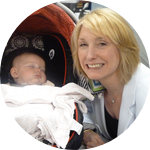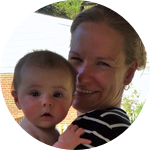About This Project
Infancy is an ideal time to study brain rhythms during sleep in humans. During the first year of life, infants' brains are rapidly changing. We’ve been perfecting our methods for two years and now need two additional E4 autonomic sensors to run a study with 15 infants, at three ages, characterizing the changes in two sleep brain rhythms: slow waves and sleep spindles, along with changes in autonomic sleep patterns, and cognitive, motor, and social-emotional development.
Ask the Scientists
Join The DiscussionWhat is the context of this research?
Sleep patterns appear to play a role in almost all known psychiatric disorders, which often parallel cognitive deficits. Studying brain rhythms during sleep at the millisecond and millimeter scale, has led to a better understanding of its role in waking behavior and cognition in adults and children. Infancy is an ideal time to study these small scale sleep rhythms, given the speed at which they change and the speed at which behavior develops. Due to my experience with a sleep disorder which affected my cognition, I learned to enhance my sleep, which followed with improved cognition. This led to a passion for sleep research, which developed during a neuroscience PhD training, after 15 years working in mobile computing. Adding mobile sensors will allow us to broaden the impact of this work.
What is the significance of this project?
This work addresses specific gaps in the human infant sleep literature due to the limited frequency of measurements across ages, the inability to adequately analyze topography of cortical brain activity given use of low resolution electroencephalography (EEG), and most importantly the lack of concurrent and prospective cognitive measures that would permit predictive comparisons. This funding will allow us to continue our work using modern high resolution, or dense-array EEG (dEEG), and standardized measures of behavioral development, while adding measures of the autonomic nervous system, with research grade mobile sensors worn on the infant's legs. This additional mobile technology data will provide the basis for more comprehensive, ecological and citizen science based sleep research.
What are the goals of the project?
We have begun to collect, analyze, and characterize data from a longitudinal group of infants at 3, 6, and more recently 9 months of age, requiring 3 visits from each infant to our lab. The data includes concurrent measures of standardized behavioral development, dEEG during daytime sleep, and bi-lateral mobile sensor data during both the wake and sleep portion of each lab-based visit. The mobile sensor data includes four autonomic measures: actigraphy, skin temperature, pulse oximetry, and skin conductance. We will characterize the topography, magnitude, spectral frequency, and density of two sleep brain rhythms: slow waves and sleep spindles, which have been linked to cognition in adults, and brain development. We will examine their correlation with behavioral and autonomic measures.
Budget
We have been piloting our work, and perfecting our methods in infants at 3.5 and 6.5 months of age, for the last 2-3 years. We have funded this pilot work through private donations, and some funding from NSF, in particular through a $2500 trainee grant to me for our first pair of mobile E4 sensors. We hope to launch a larger study in the near future, with funding from NIH. For now, we have the lab equipment (EEG technology), two E4 mobile sensors, lab space, computers, and staff, but we need two additional E4 sensors, and money to pay and help recruit participants. Recruitment for participants in our research has become much harder over the years, and we need funds for creative promotion of our work to families who have or are expecting infants and are within a reasonable driving distance of our lab. We aim to recruit 15 infants before the age of 3.5 months. Participants receive $30 and a letter about their infant's behavioral development, after each of the three visits.
Endorsed by
Meet the Team
Affiliates
Team Bio
Infant brain development research takes a village. The Infancy Studies Lab, at Rutgers University - Newark, is a village of passionate researchers with over 60 years of combined experience working with children and infants. While sleep is a fairly new area of research for our lab, it is a logical next step for understanding how the speech and language related research we do can be influenced and even enhanced by sleep. Our lab director, Dr. April Ann Benasich, has an extensive biography.
Sue Peters
As a first year student in the Behavioral Neural Sciences PhD program at the Center for Molecular and Behavioral Neuroscience, I helped to introduce the first human cognitive neuroscience sleep research at the center, in a computational cognitive neuroscience learning and memory research lab. Using my background as a co-founder of a public mobile computing company, BrainDock, I co-wrote a successful proposal to the NSF Smart and Connected Health program. I co-facilitated the launch of this new area of research: "Long-term Mobile Monitoring and Analysis of Sleep-Cognition Relationship", which has led to novel findings of the trait-like aspects of sleep stages (REM and NonREM) with learning and emotion (in press). In 2012, I joined the Infancy Studies Laboratory, to learn dense EEG (dEEG) analysis skills with application to spontaneous wake brain activity of infants. For my thesis work, I initiated a new area of research in this lab, with a pilot study of infant daytime sleep. This work has led to my passion for understanding sleep microstructure and infant brain development, as it relates to information integration, emotional and cognitive development, and the development and prevention of psychiatric disorders. As an undergraduate student of biomedical engineering and computer science, I have the technical foundation required for work in scientific computing and digital signal processing. I continue to learn new dEEG analysis techniques that are used in adult research, and apply them to infant brain activity. These projects have been presented at various sleep, neuroscience, and learning and memory conferences, and are the foundation toward my long-term goals of combining lab-based research with more ethological monitoring tools, taking advantage of mobile health technologies and citizen science to help us to better understand developmental brain health, and provide mechanisms and interventions which will empower individuals to have a better quality of life.
Additional Information
Two scientific posters, with more detailed background and hypotheses, and in which relevant pilot data in the 3 and 6 month age groups have been presented, are available for viewing here.
2.Novel Approaches to Measuring Infant Daytime Sleep Neurophysiology and Autonomic Activity
Project Backers
- 73Backers
- 100%Funded
- $4,945Total Donations
- $66.82Average Donation


